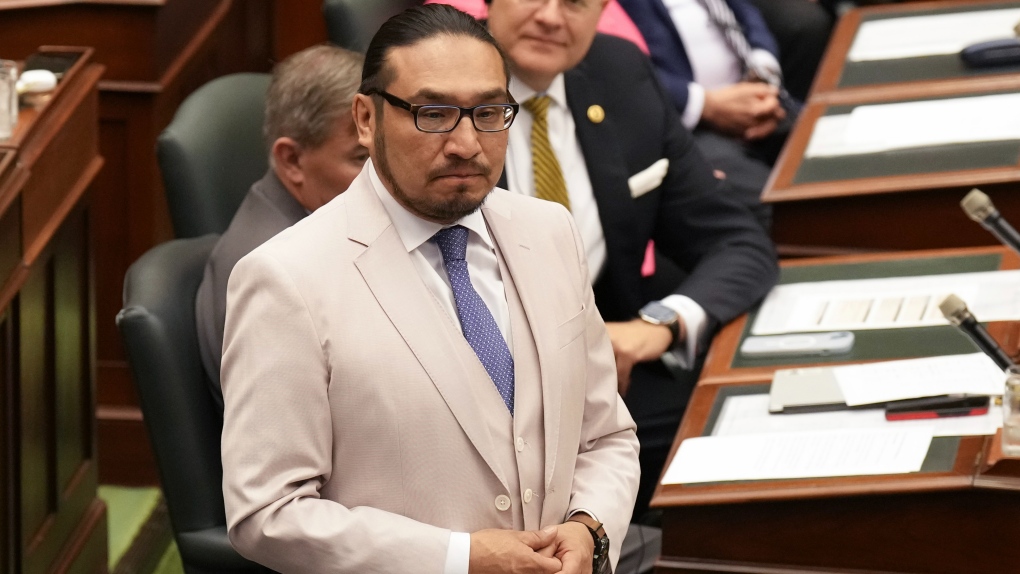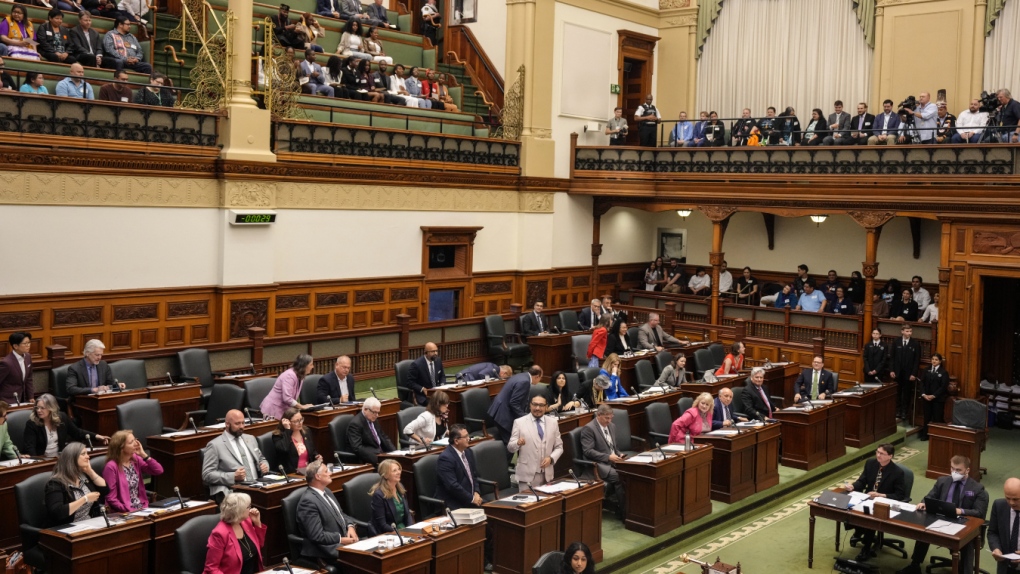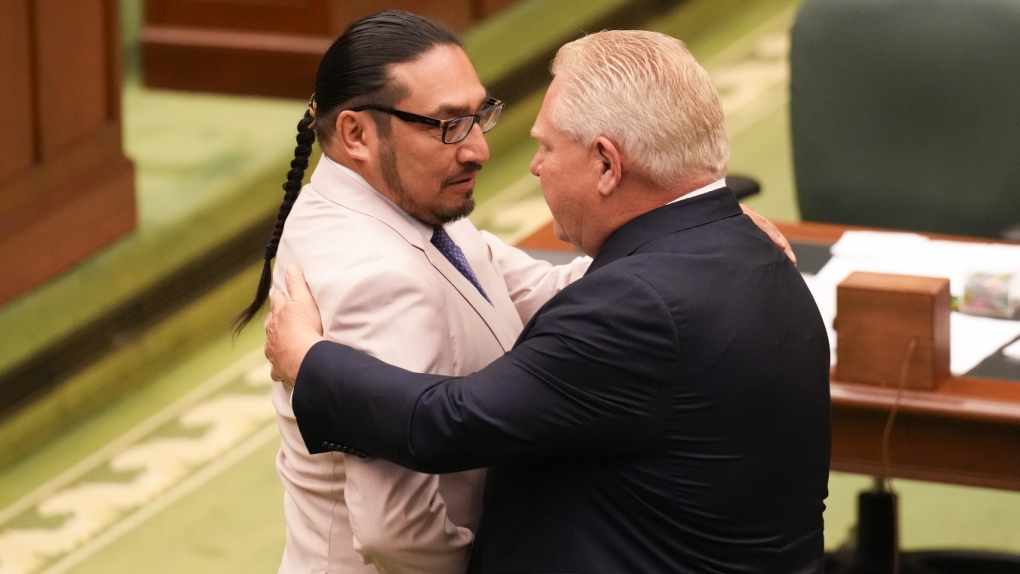First Nation legislator makes history at Queen's Park with speech in Oji-Cree
After decades of being told his first language should be forgotten, Sol Mamakwa stood on the floor of the Ontario legislature about to make history.
 New Democrat Sol Mamakwa stands in the Ontario Legislature in Toronto on Tuesday, May 28, 2024. The First Nation legislator addressed Queen's Park in his own language Tuesday, marking the first time a language other than English and French has officially been allowed in Ontario's legislative chamber. Mamakwa spoke for 10 minutes in Anishininiimowin, or Oji-Cree, to the Ontario legislature. (Chris Young/THE CANADIAN PRESS)
New Democrat Sol Mamakwa stands in the Ontario Legislature in Toronto on Tuesday, May 28, 2024. The First Nation legislator addressed Queen's Park in his own language Tuesday, marking the first time a language other than English and French has officially been allowed in Ontario's legislative chamber. Mamakwa spoke for 10 minutes in Anishininiimowin, or Oji-Cree, to the Ontario legislature. (Chris Young/THE CANADIAN PRESS)
But he couldn't shake the thought that he should continue in English and not Anishininiimowin, also called Oji-Cree, the language his mother taught him.
"I thought I was breaking the laws and the rules of this house and I tried to remind myself that there's nothing wrong with this, 'You're allowed to speak,"' Mamakwa said.
And so he did.
In a moment that made history, the New Democrat – and the only First Nation legislator in the province – addressed Queen's Park in his own language on Tuesday, marking the first time a language other than English and French has been allowed by officials in Ontario's legislative chamber.
In the process, the 53-year-old Mamakwa secured a pledge from the premier to build a long-term care home in Sioux Lookout, Ont.
"I want to say thank you to everyone present. I'm very grateful, thankful for the opportunity to be able to speak my Anishininiimowin, in Indigenous Oji-Cree language in this legislature," Mamakwa said through an interpreter at the start of his speech.
"I am speaking for those that couldn't use our language and also for those people from Kiiwetinoong, not only those from Kiiwetinoong, but for every Indigenous person in Ontario."
Ontario's legislature had not previously allowed interpreting and transcribing a language other than English and French.
 NDP MPP Sol Mamakwa stands in the Ontario legislature in Toronto, on Tuesday, May 28, 2024, and speaks in his language, Oji-Cree, the first time in history that Indigenous language has been used in the provincial legislature to ask a question of the government. (Chris Young/THE CANADIAN PRESS)
NDP MPP Sol Mamakwa stands in the Ontario legislature in Toronto, on Tuesday, May 28, 2024, and speaks in his language, Oji-Cree, the first time in history that Indigenous language has been used in the provincial legislature to ask a question of the government. (Chris Young/THE CANADIAN PRESS)
About 100 supporters gathered in Toronto to watch the historic moment, including Mamakwa's mother, siblings, friends and First Nation leaders. It was a gift to his mom, Kezia Mamakwa, who turned 79 on Tuesday.
Politicians sang "Happy Birthday" to her and gave several standing ovations to Sol Mamakwa in an emotional question period.
"Today was monumental for me," Mamakwa said afterward.
After his speech, Mamakwa took the lead questions during question period, grilling the government in his language about elder care in the north. He demanded to know if, or when, the government would follow through on its commitment to build 76 more beds at a nursing home in Sioux Lookout.
"I'm committing today in the public: we will be building those beds. We'll be building a home in Sioux Lookout," Premier Doug Ford said.
The premier said he was proud of Mamakwa, who sits directly across from Ford in the chamber.
"No one's ever done this, what you're doing today," Ford said. "I just want to tell you how proud I am of you, how proud everyone here in the legislature is, how proud everyone is in the First Nations."
Mamakwa and Ford met in the middle of the room and hugged.
 NDP MPP Sol Mamakwa (left) meets Ontario Premier Doug Ford on the middle of the floor of the Ontario legislature in Toronto, on Tuesday, May 28, 2024, after speaking in his language, Oji-Cree, the first time in history that Indigenous language has been used in the legislature to ask a question of the government. (Chris Young/THE CANADIAN PRESS)
NDP MPP Sol Mamakwa (left) meets Ontario Premier Doug Ford on the middle of the floor of the Ontario legislature in Toronto, on Tuesday, May 28, 2024, after speaking in his language, Oji-Cree, the first time in history that Indigenous language has been used in the legislature to ask a question of the government. (Chris Young/THE CANADIAN PRESS)
Over the last century, Indigenous languages across Canada have been dying. Governments in the past, along with help from the Catholic and Protestant churches, ripped First Nation children from their homes and forced them to learn English in residential and day schools. Children would be punished for speaking their own language.
Mamakwa was no different.
He spent two years as a teenager in a residential school in northwestern Ontario. He and his friends would be punished if he spoke Anishininiimowin. Sometimes it would be detention, other times it would be worse. Similar punishment would be doled out across the country at the residential schools, the last of which shut down in 1996.
"Sometimes even soap was used to wash their mouth for speaking Anishininiimowin, Oji-Cree language," Mamakwa said through the chamber's first interpretation of an Indigenous language.
"They were given manual labour for speaking in their own language in residential schools."
A proud mother
Kezia Mamakwa looked on from the gallery as her son spoke in the language she taught him.
 New Democrat Sol Mamakwa poses for a photo with his mother Kezia Mamakwa at the Ontario Legislature in Toronto on Tuesday, May 28, 2024. The First Nation legislator addressed Queen's Park in his own language Tuesday, marking the first time a language other than English and French has officially been allowed in Ontario's legislative chamber. Mamakwa spoke for 10 minutes in Anishininiimowin, or Oji-Cree, to the Ontario legislature. (Chris Young/THE CANADIAN PRESS)
New Democrat Sol Mamakwa poses for a photo with his mother Kezia Mamakwa at the Ontario Legislature in Toronto on Tuesday, May 28, 2024. The First Nation legislator addressed Queen's Park in his own language Tuesday, marking the first time a language other than English and French has officially been allowed in Ontario's legislative chamber. Mamakwa spoke for 10 minutes in Anishininiimowin, or Oji-Cree, to the Ontario legislature. (Chris Young/THE CANADIAN PRESS)
"She used to take me out into the wilderness, into the land, teaching me the language," Sol Mamakwa said of his mom.
"She taught me and also other people – also the youth, the children, our grandchildren, our great grandchildren, they need to continue on in their First Nations language so that they can speak their own language."
Looking to save Indigenous languages
Mamakwa called on First Nations to save their languages while there are still older generations who speak it.
"Everyone that's listening: we need to revitalize our First Nations language, teach your children to speak the First Nations language and to be proud of it."
Mamakwa sparked the change at Queen's Park after convincing Government House Leader Paul Calandra to allow him to speak at the legislature in the language his parents taught him.
The legislator from Kingfisher Lake First Nation in northern Ontario has said the milestone is important because Indigenous people are losing their languages, and his speech and questions in the legislature would mark a step toward reconciliation.
Calandra changed the standing orders on languages spoken in the legislative chamber to include any Indigenous language spoken in Canada.
The legislature brought in interpreters to translate Mamakwa's words in real time. Mamakwa's words will also be represented in syllabics, an Indigenous writing system, in Hansard, the official record of proceedings at Queen's Park.
A historic moment
Numerous First Nation leaders took in the historic moment.
"To hear your language being spoken in the most colonial institution in this province is something that many of us never thought we would ever witness," said Grand Chief Alvin Fiddler of Nishnawbe Aski Nation, which represents 49 First Nations in northwestern Ontario.
"It's something that is long overdue."
Neskantaga First Nation Chief Chris Moonias said the language change is very important to his people.
"All of us thought that would never happen, but we survived," he said. "We survived through cultural genocide, we survived through mental health addictions, we survived residential schools, we survived day schools."
It was also an emotional day for Mamakwa's family. Mamakwa honoured his later father, Jerry, who died in 2018.
Mamakwa's brother, Jonathon Mamakwa, said his dad was with them in spirit.
"He always told us to do something," he said, "and Sol just did something great."
– This report by The Canadian Press was first published May 28, 2024.
CTVNews.ca Top Stories

Mark Carney reaches out to dozens of Liberal MPs ahead of potential leadership campaign
Mark Carney, the former Bank of Canada and Bank of England governor, is actively considering running in a potential Liberal party leadership race should Justin Trudeau resign, sources tell CTV News.
'I gave them a call, they didn't pick up': Canadian furniture store appears to have gone out of business
Canadian furniture company Wazo Furniture, which has locations in Toronto and Montreal, appears to have gone out of business. CTV News Toronto has been hearing from customers who were shocked to find out after paying in advance for orders over the past few months.
WATCH Woman critically injured in explosive Ottawa crash caught on camera
Dashcam footage sent to CTV News shows a vehicle travelling at a high rate of speed in the wrong direction before striking and damaging a hydro pole.
A year after his son overdosed, a Montreal father feels more prevention work is needed
New data shows opioid-related deaths and hospitalizations are down in Canada, but provincial data paints a different picture. In Quebec, drug related deaths jumped 30 per cent in the first half of 2024, according to the public health institute (INSPQ).
Rideau Canal Skateway opening 'looking very positive'
As the first cold snap of 2025 settles in across Ottawa, there is optimism that the Rideau Canal Skateway will be able to open soon.
Much of Canada is under a weather alert this weekend: here's what to know
From snow, to high winds, to extreme cold, much of Canada is under a severe weather alert this weekend. Here's what to expect in your region.
Jimmy Carter's funeral begins by tracing 100 years from rural Georgia to the world stage
Jimmy Carter 's extended public farewell began Saturday in Georgia, with the 39th U.S. president’s flag-draped casket tracing his long arc from the Depression-era South and family farming business to the pinnacle of American political power and decades as a global humanitarian.
'A really powerful day': Commemorating National Ribbon Skirt Day in Winnipeg
Dozens donned colourful fabrics and patterns Saturday in honour of the third-annual National Ribbon Skirt Day celebrated across the country.
Jeff Baena, writer, director and husband of Aubrey Plaza, dead at 47
Jeff Baena, a writer and director whose credits include 'Life After Beth' and 'The Little Hours,' has died, according to the Los Angeles County Medical Examiner.

































